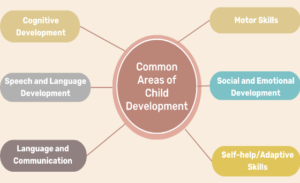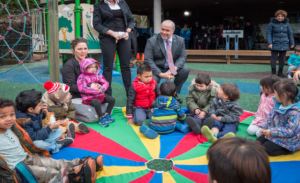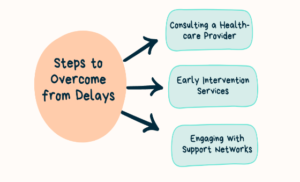How Is Early Child Development Delay Identified?
The early childhood years are crucial for a child development and growth, filled with excitement and rapid change. During the toddler stage, children reach important milestones in motor skills, communication, social interaction, and cognitive abilities. However, some children may not progress as quickly as their peers, leading to delays in these developmental areas. Identifying these delays early is essential, as they can significantly affect a child’s long-term development and quality of life. This blog will provide information on detecting early childhood development delays, recognizing their signs, and offering guidance for parents and caregivers to ensure children receive the appropriate support.
Understanding Early Childhood Development Delays
What Are Developmental Delays?
Developmental delays occur when a child does not reach key milestones in motor skills, communication, social interaction, or cognitive abilities within the typical age range. These delays can manifest as difficulties with movement, language, social skills, or problem-solving. Identifying developmental delays early is crucial because timely intervention can significantly improve a child’s long-term outcomes. Early support helps address challenges, build skills, and support overall growth, ultimately enhancing the child’s ability to thrive both academically and socially.
Check out our Fundamentals of Child Psychology course to elevate yourself.

Common Areas of Development
Developmental delays can be observed in a number of crucial arenas, any of which can limit a child’s holistic development:
Cognitive Development: This refers to a child’s ability to think,problem-solving, and learning abilities, such as memory, attention, and reasoning. A delay in cognitive development may be manifested if a child has difficulty following directions, understanding concepts, or participating in age-appropriate activities.
Language and Communication: This involves understanding and using language, including speech, gestures, and listening.
Speech and Language Development: The ability to understand and then convey these skills. Suppose a child isn’t speaking as much as other children their age or is having difficulty understanding what others are saying. In that case, this may be an area to look into.
Motor Skills: This refers to developing fine motor skills, such as being able to clap hands or grasp objects, and gross motor skills, such as crawling, walking, and jumping. A delay in motor skills may be present if your child is not able to sit up, walk, or accomplish other physical tasks as expected for their age.
Social and Emotional Development: This refers to a child’s interactions with other people, expression of emotion, and development of relationships. A child who has difficulty with social and emotional development will be slow to interact with other children and may have problems sharing and taking turns.
Self-help/Adaptive Skills: This focuses on everyday skills like dressing, eating, and personal hygiene.
Causes of Developmental Delays
Developmental delays in children can be caused by various factors, including genetic conditions like Down syndrome, premature birth, and environmental influences such as malnutrition or exposure to toxins. Medical issues, such as chronic illnesses or untreated hearing and vision problems, can also contribute. Additionally, emotional trauma or neglect during early years may impact a child’s ability to reach developmental milestones on time. Identifying the underlying cause is key to providing appropriate support and intervention. However, it is important to identify developmental delays early and intervene to help children reach their full potential.
Recognizing Signs of Developmental Delays
Cognitive Development
Difficulty with Problem-Solving: If your child often seems confused by tasks like sorting shapes or completing simple puzzles, it could be a sign of a cognitive delay.
Memory challenges: Trouble remembering instructions, routines, or new information.
Lack of Curiosity: Curiosity is a normal characteristic of all children. A lack of interest in exploring the environment or interacting with new toys might be a sign of a developmental delay.
Delayed Learning of Basic Concepts: If a child learns words for colors, shapes, or numbers later than most do, then this might indicate a cognitive developmental delay.
Poor information processing: Difficulty organizing, interpreting, and using new information effectively.
Speech and Language Development
Delayed speech milestones: By the time your child is 12 months old, you should be worried if she’s not babbling; by 18 months, you should be concerned if she’s not using single words; by age 2, you should be concerned if she’s still not forming simple sentences.
Small vocabulary: If your child has fewer words or combinations of words than the majority of children her age, she may be experiencing a language delay. Incoherent sentences: your child’s sentences are not well-formed for her age.
Problems with Understanding Language: Difficulty following a simple direction or answering a simple question are red flags for an expressive language delay.
Difficulty forming sentences: Trouble putting words together to make sentences.
Speech clarity issues: Difficulty pronouncing words, making speech hard to understand.
Trouble following instructions: Difficulty understanding or responding to simple directions.
Motor Skills Development
Delayed Gross Motor Skills: If your child is not sitting up by nine months, crawling by 12 months, or not walking by 18 months, you might be concerned.
Fine Motor Skills Problems: Challenges with activities that require dexterity of the hand, like holding a pencil, or using small utensils, may be an indication of fine motor delays.
Poor Coordination: If a child is clumsy and has poor balance and coordination coordination coordination, this may be a sign of delayed motor skills.
Enrol our Childhood Development Essentials course from Jobsland.
Social and Emotional Development
Difficulty Interacting with Others: A child who doesn’t play with other children, who rarely engages in social activities, or who seems to like being alone more than interacting with others may be lacking in social development.
Difficulties in Emotion Regulation: Frequent temper tantrums; inability to calm down when upset; or extreme emotions that are not age-appropriate.
Trouble forming attachments: If your child has difficulty bonding with caregivers or doesn’t seem interested in relationships, this could be a sign of a social and emotional developmental delay.
Poor Social Skills: Difficulty with basic social interactions, like taking turns, sharing, or making eye contact.
Problems with Empathy: Challenges in understanding or responding to others’ feelings.
Struggles with Self-regulation: Difficulty managing emotions or behavior, such as frequent tantrums or aggressive responses.
Difficulty Adapting to Social Norms: Trouble following social rules or understanding expectations in group settings.
The Role of Developmental Screenings

What Are Developmental Screenings?
Developmental screenings are quick checks used to spot if a child might have delays or issues in their growth. These screenings use simple questions, observations, and tests to see how a child is doing in areas like moving, talking, playing with others, and thinking. Doctors or early childhood programs often do these checks during regular visits. Finding issues early helps get the right support and improves the child’s development and future success.
When Should Screenings Occur?
Pediatricians and other healthcare providers typically screen for developmental delays during well-child visits (9 months, 18 months, 24, or 30 months). They will do so at any time if families are concerned about their child’s development.
How Do Screenings Help?
For example, developmental screenings help parents see how their child is growing. They can show areas where the child might need extra support. If a screening suggests a delay, it can guide parents on what to do next. This might include getting a detailed evaluation and starting early intervention services.

Steps to Take If a Delay Is Suspected
Consulting a Health-care Provider
If there are concerns about the child’s development, parents or other caregivers should talk to a health-care provider. A paediatrician or developmental specialist can monitor and evaluate the child and make referrals for more diagnostic testing or early intervention to address the developmental delay.
Early Intervention Services
If a delay is diagnosed, children can get services to help with missed milestones. These services may include speech, occupational, physical, and special education therapies. Early intervention is key to helping children reach their full potential.
Engaging with Support Networks
Parents and caregivers should not give up. They should seek help from professionals and get support from family and community groups. Support groups can connect families with resources and offer emotional support as they help their children.
Conclusion
Identifying developmental delays early is crucial for giving children the best chance to learn and grow. Parents and caregivers should watch for warning signs, use developmental screenings, and act quickly if they suspect delays. Knowing when and how to seek help is very important. Early identification and support can greatly benefit a child. If you have concerns about your child’s development, talk to your healthcare provider about what you’ve noticed and the next steps to take.

